21世纪大学英语读写教程(第四册)课文译文
21世纪大学英语读写教程第四册 (1)
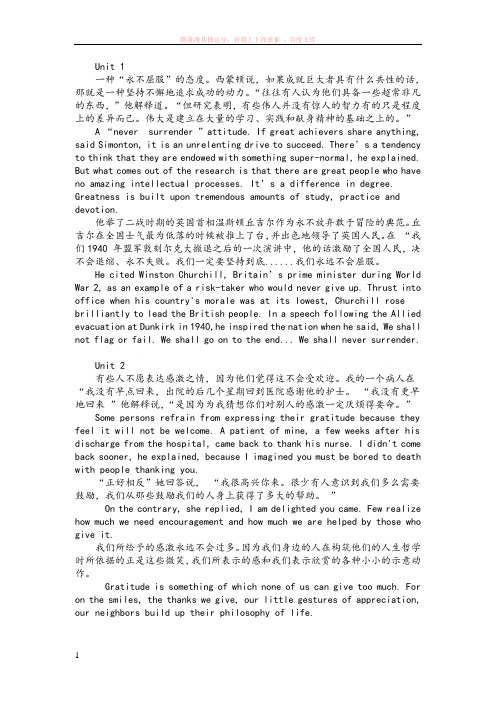
一种“永不屈服”的态度。
西蒙顿说,如果成就巨大者具有什么共性的话,那就是一种坚持不懈地追求成功的动力。
“往往有人认为他们具备一些超常非凡的东西,”他解释道。
“但研究表明,有些伟人并没有惊人的智力有的只是程度上的差异而已。
伟大是建立在大量的学习、实践和献身精神的基础之上的。
”A “never surrender ”attitude. If great achievers share anything, said Simonton, it is an unrelenting drive to succeed. There’s a tendency to think that they are endowed with something super-normal, he explained. But what comes out of the research is that there are great people who have no amazing intellectual processes. It’s a difference in degree. Greatness is built upon tremendous amounts of study, practice and devotion.他举了二战时期的英国首相温斯顿丘吉尔作为永不放弃敢于冒险的典范。
丘吉尔在全国士气最为低落的时候被推上了台,并出色地领导了英国人民。
在“我们1940 年盟军敦刻尔克大撤退之后的一次演讲中,他的话激励了全国人民,决不会退缩、永不失败。
我们一定要坚持到底......我们永远不会屈服。
He cited Winston Churchill, Britain’s prime minister during World War 2, as an example of a risk-taker who would never give up. Thrust into office when his country's morale was at its lowest, Churchill rose brilliantly to lead the British people. In a speech following the Allied evacuation at Dunkirk in 1940,he inspired the nation when he said, We shall not flag or fail. We shall go on to the end... We shall never surrender.Unit 2有些人不愿表达感激之情,因为他们觉得这不会受欢迎。
2020年整理21世纪大学英语读写教程(第四册)课后句子翻译.doc
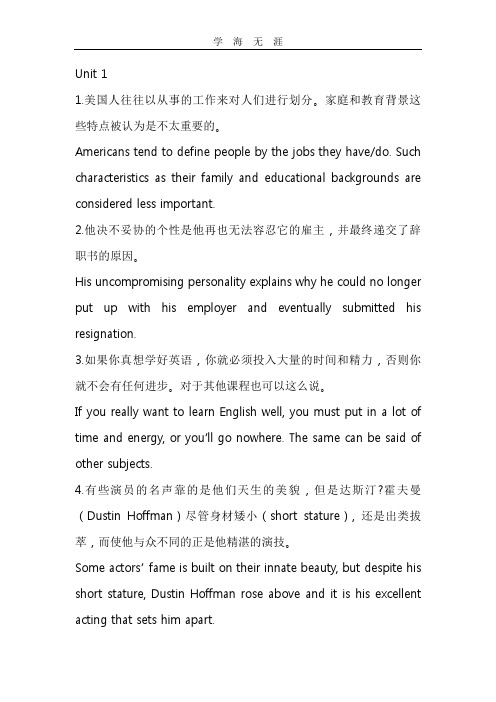
Unit 11.美国人往往以从事的工作来对人们进行划分。
家庭和教育背景这些特点被认为是不太重要的。
Americans tend to define people by the jobs they have/do. Such characteristics as their family and educational backgrounds are considered less important.2.他决不妥协的个性是他再也无法容忍它的雇主,并最终递交了辞职书的原因。
His uncompromising personality explains why he could no longer put up with his employer and eventually submitted his resignation.3.如果你真想学好英语,你就必须投入大量的时间和精力,否则你就不会有任何进步。
对于其他课程也可以这么说。
If you really want to learn English well, you must put in a lot of time and energy, or you’ll go nowhere. The same can be said of other subjects.4.有些演员的名声靠的是他们天生的美貌,但是达斯汀?霍夫曼(Dustin Hoffman)尽管身材矮小(short stature), 还是出类拔萃,而使他与众不同的正是他精湛的演技。
Some actors’fame is built on their innate beauty, but despite his short stature, Dustin Hoffman rose above and it is his excellent acting that sets him apart.5.他负责管理之后,我们发现他与前任(predecessor)有明显的不同:他有干劲和激情,想出了很多新点子,并把工作重点放在如何鼓舞我们的士气上。
21世纪大学英语读写教学教程(第四册)课后句子翻译

Unit 11.美国人往往以从事的工作来对人们进行划分。
家庭和教育背景这些特点被认为是不太重要的。
Americans tend to define people by the jobs they have/do. Such characteristics as their family and educational backgrounds are considered less important.2.他决不妥协的个性是他再也无法容忍它的雇主,并最终递交了辞职书的原因。
His uncompromising personality explains why he could no longer put up with his employer and eventually submitted his resignation.3.如果你真想学好英语,你就必须投入大量的时间和精力,否则你就不会有任何进步。
对于其他课程也可以这么说。
If you really want to learn English well, you must put in a lot of time and energy, or you’ll go nowhere. The same can be said of other subjects.4.有些演员的名声靠的是他们天生的美貌,但是达斯汀?霍夫曼(Dustin Hoffman)尽管身材矮小(short stature), 还是出类拔萃,而使他与众不同的正是他精湛的演技。
Some actors’fame is built on their innate beauty, but despite his short stature, Dustin Hoffman rose above and it is his excellent acting that sets him apart.5.他负责管理之后,我们发现他与前任(predecessor)有明显的不同:他有干劲和激情,想出了很多新点子,并把工作重点放在如何鼓舞我们的士气上。
21世纪大学英语教程(第四册)Unit1课文原文
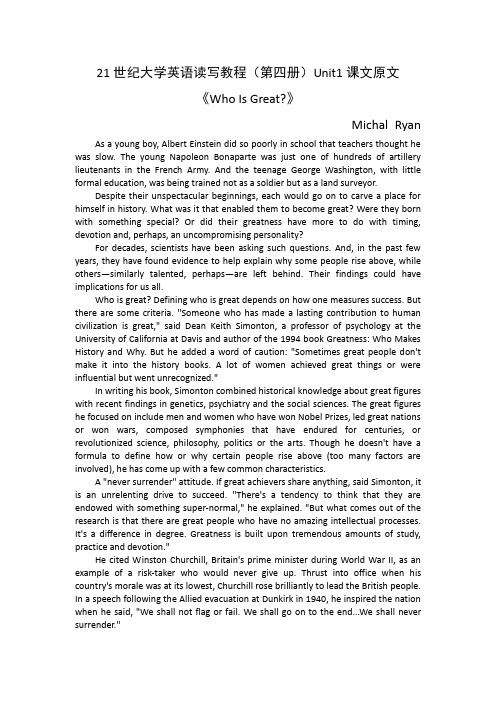
21世纪大学英语读写教程(第四册)Unit1课文原文《Who Is Great?》Michal Ryan As a young boy, Albert Einstein did so poorly in school that teachers thought he was slow. The young Napoleon Bonaparte was just one of hundreds of artillery lieutenants in the French Army. And the teenage George Washington, with little formal education, was being trained not as a soldier but as a land surveyor.Despite their unspectacular beginnings, each would go on to carve a place for himself in history. What was it that enabled them to become great? Were they born with something special? Or did their greatness have more to do with timing, devotion and, perhaps, an uncompromising personality?For decades, scientists have been asking such questions. And, in the past few years, they have found evidence to help explain why some people rise above, while others—similarly talented, perhaps—are left behind. Their findings could have implications for us all.Who is great? Defining who is great depends on how one measures success. But there are some criteria. "Someone who has made a lasting contribution to human civilization is great," said Dean Keith Simonton, a professor of psychology at the University of California at Davis and author of the 1994 book Greatness: Who Makes History and Why. But he added a word of caution: "Sometimes great people don't make it into the history books. A lot of women achieved great things or were influential but went unrecognized."In writing his book, Simonton combined historical knowledge about great figures with recent findings in genetics, psychiatry and the social sciences. The great figures he focused on include men and women who have won Nobel Prizes, led great nations or won wars, composed symphonies that have endured for centuries, or revolutionized science, philosophy, politics or the arts. Though he doesn't have a formula to define how or why certain people rise above (too many factors are involved), he has come up with a few common characteristics.A "never surrender" attitude. If great achievers share anything, said Simonton, it is an unrelenting drive to succeed. "There's a tendency to think that they are endowed with something super-normal," he explained. "But what comes out of the research is that there are great people who have no amazing intellectual processes. It's a difference in degree. Greatness is built upon tremendous amounts of study, practice and devotion."He cited Winston Churchill, Britain's prime minister during World War II, as an example of a risk-taker who would never give up. Thrust into office when his country's morale was at its lowest, Churchill rose brilliantly to lead the British people. In a speech following the Allied evacuation at Dunkirk in 1940, he inspired the nation when he said, "We shall not flag or fail. We shall go on to the end...We shall never surrender."Can you be born great? In looking at Churchill's role in history—as well as the roles of other political and military leaders—Simonton discovered a striking pattern: "Firstborns and only children tend to make good leaders in time of crisis: They're used to taking charge. But middle-borns are better as peacetime leaders: They listen to different interest groups better and make the necessary compromises. Churchill, an only child, was typical. He was great in a crisis, but in peacetime he was not effective—not even popular."Timing is another factor. "If you took George Washington and put him in the 20th century he would go nowhere as a politician," Simonton declared. "He was not an effective public speaker, and he didn't like shaking hands with the public. On the other hand, I'm not sure Franklin Roosevelt would have done well in Washington's time. He wouldn't have had the radio to do his fireside chats."Can you be too smart? One surprise among Simonton's findings is that many political and military leaders have been bright but not overly so. Beyond a certain point, he explained, other factors, like the ability to communicate effectively, become more important than innate intelligence as measured by an IQ test. The most intelligent U.S. Presidents, for example—Thomas Jefferson, Woodrow Wilson and John F. Kennedy—had a hard time getting elected, Simonton said, while others with IQs closer to the average (such as Warren G. Harding) won by landslides. While political and economic factors also are involved, having a genius IQ is not necessary to be a great leader.In the sciences, those with "genius level" IQs do have a better chance at achieving recognition, added Simonton. Yet evidence also indicates that overcoming traditional ways of thinking may be just as important.He pointed to one recent study where college students were given a set of data and were asked to see if they could come up with a mathematical relation. Almost a third did. What they did not know was that they had just solved one of the most famous scientific equations in history: the Third Law of Planetary Motion, an equation that Johannes Kepler came up with in 1618.Kepler's genius, Simonton said, was not so much in solving a mathematical challenge. It was in thinking about the numbers in a unique way—applying his mathematical knowledge to his observations of planetary motion. It was his boldness that set him apart.Love your work. As a child, Einstein became fascinated with the way magnets are drawn to metal. "He couldn't stop thinking about this stuff," Simonton pointed out. "He became obsessed with problems in physics by the time he was 16, and he never stopped working on them. It's not surprising that he made major contributions by the time he was 26.""For most of us, it's not that we don't have the ability," Simonton added, "it's that we don't devote the time. You have to put in the effort and put up with all the frustrations and obstacles."Like other creative geniuses, Einstein was not motivated by a desire for fame, said Simonton. Instead, his obsession with his work was what set him apart.Where such drive comes from remains a mystery. But it is found in nearly allcreative geniuses—whether or not their genius is acknowledged by contemporaries."Emily Dickinson was not recognized for her poetry until after her death," said Simonton. "But she was not writing for fame. The same can be said of James Joyce, who didn't spend a lot of time worrying about how many people would read Finnegans Wake."Today, researchers have evidence that an intrinsic passion for one's work is a key to rising above. In a 1985 study at Brandeis University conducted by Teresa Amabile, now a professor of business administration at Harvard University, a group of professional writers—none famous—were asked to write a short poem. Each writer was then randomly placed in one of three groups: One group was asked to keep in mind the idea of writing for money; another was told to think about writing just for pleasure; and a third group was given no instruction at all.The poems then were submitted anonymously to a panel of professional writers for evaluation. The poetry written by people who thought about writing for money ranked lowest. Those who thought about writing just for pleasure did the best. "Motivation that comes from enjoying the work makes a significant difference, "Amabile said.。
21世纪大学英语读写教程第四册课后答案及翻译
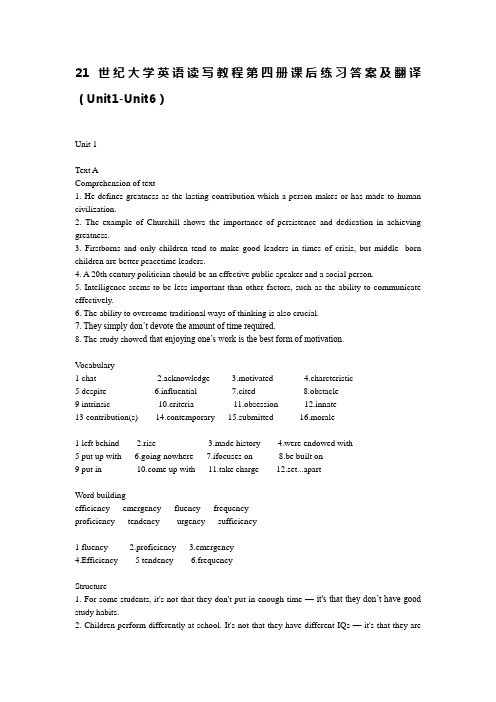
21世纪大学英语读写教程第四册课后练习答案及翻译(Unit1-Unit6)Unit 1Text AComprehension of text1. He defines greatness as the lasting contribution which a person makes or has made to human civilization.2. The example of Churchill shows the importance of persistence and dedication in achieving greatness.3. Firstborns and only children tend to make good leaders in times of crisis, but middle- born children are better peacetime leaders.4. A 20th century politician should be an effective public speaker and a social person.5. Intelligence seems to be less important than other factors, such as the ability to communicate effectively.6. The ability to overcome traditional ways of thinking is also crucial.7. They simply don‟t devote the amount of time required.8. The study showe d that enjoying one‟s work is the best form of motivation.V ocabulary1 chat 2.acknowledge 3.motivated 4.charcteristic5 despite 6.influential 7.cited 8.obstacle9 intrinsic 10.criteria 11.obsession 12.innate13 contribution(s) 14.contemporary 15.submitted 16.morale1 left behind 2.rise 3.made history 4.were endowed with5 put up with 6.going nowhere 7.ifocuses on 8.be built on9 put in e up with 11.take charge 12.set...apartWord buildingefficiency emergency fluency frequencyproficiency tendency urgency sufficiency1 fluency 2.proficiency 3.emergency4.Efficiency 5 tendency 6.frequencyStructure1. For some students, it's not that they don't put in enough time —it's that they don‟t have good study habits.2. Children perform differently at school. It's not that they have different IQs — it's that they arebrought up in different environments.3. The company is not very productive. It's not that its staff aren't talented — it's that their energy hasn't been channeled effectively.4. I‟m really sorry. It's not that I don't want to go to the cinema with you— it's that I have to finish my paper tonight.5. You have a stomachache. It's not that the food was bad — it's probably that you have too much stress from your work.1. President Wilson didn't try to bring the US back to economic and political isolation. Instead, he believed in international cooperation through an association of nations.puters don't teach students in groups. Instead, they can help them learn effectively according to their different needs.3. We shouldn't focus on minor points. Instead, we should try to solve the problem of the greatest urgency at present.4. He doesn‟t get anybody else to help him. Instead, he likes to attend to everything himself.5. Teaching success shouldn't be measured by the scores the students receive on tests. Instead, it should be measured by whether the students have internalized the ability and desire to learn. Close1-5 BCBAD6-10 DCABA11-15 DABCATransition西蒙顿说,如果事业上取得巨大成就者具有什么共性的话,那就是一种持续不断地追求成功的动力。
21世纪大学英语读写教程第四册cloze中英文对照版
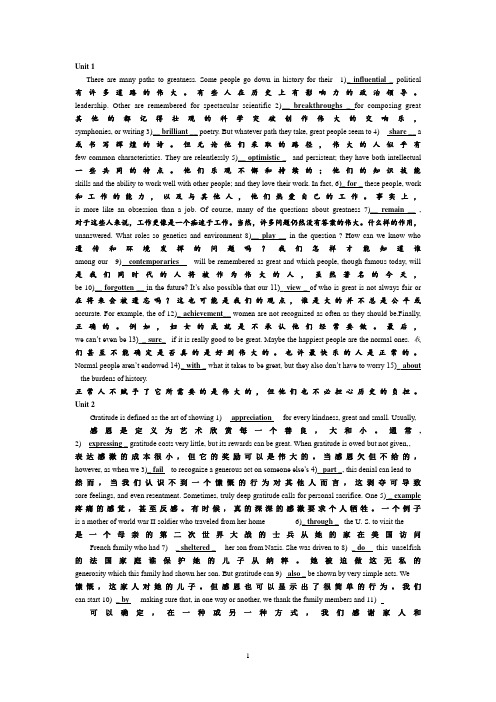
Unit 1There are many paths to greatness. Some people go down in history for their 1)_ influential _political 有许多道路的伟大。
有些人在历史上有影响力的政治领导。
leadership. Other are remembered for spectacular scientific 2)__ breakthroughs _ for composing great 其他的都记得壮观的科学突破创作伟大的交响乐,symphonies, or writing 3)__ brilliant __ poetry. But whatever path they take, great people seem to 4)__ share __ a 或书写辉煌的诗。
但无论他们采取的路径,伟大的人似乎有few common characteristics. They are relentlessly 5)__ optimistic __ and persistent; they have both intellectual 一些共同的特点。
他们乐观不懈和持续的;他们的知识技能skills and the ability to work well with other people; and they love their work. In fact, 6)_ for _ these people, work 和工作的能力,以及与其他人,他们热爱自己的工作。
事实上,is more like an obsession than a job. Of course, many of the questions about greatness 7)__ remain __, 对于这些人来说,工作更像是一个痴迷于工作。
当然,许多问题仍然没有答案的伟大。
21世纪大学生读写教程第四册READING ALOUD汉英+课后翻译
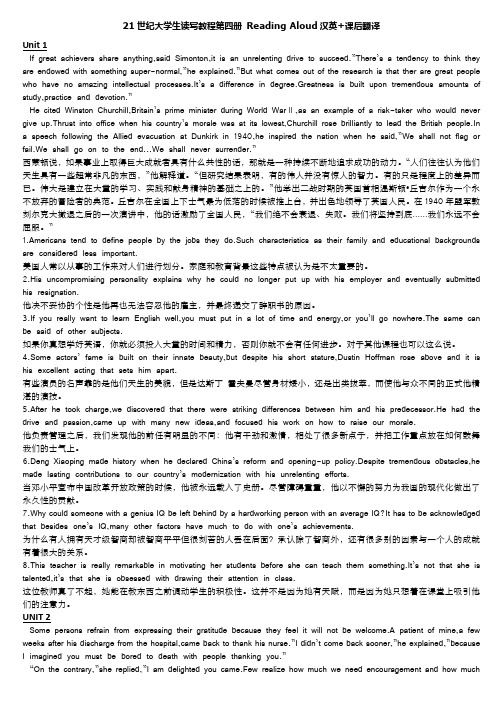
21世纪大学生读写教程第四册Reading Aloud汉英+课后翻译Unit 1If great achievers share anything,said Simonton,it is an unrelenting drive to succeed.”There‟s a tendency to think they are endowed with something super-normal,”he explained.”But what comes out of the research i s that ther are great people who have no amazing intellectual processes.It‟s a difference in degree.Greatness is built upon tremendous amounts of study,practice and devotion.”He cited Winston Churchill,Britain‟s prime minister during World WarⅡ,as an example of a risk-taker who would never give up.Thrust into office when his country‟s morale was at its lowest,Churchill rose brilliantly to lead the British people.In a speech following the Allied evacuation at Dunkirk in 1940,he inspired the nation when he said,”We shall not flag or fail.We shall go on to the end...We shall never surrender.”西蒙顿说,如果事业上取得巨大成就者具有什么共性的话,那就是一种持续不断地追求成功的动力。
21世纪大学英语读写教程第四册答案及课文翻译
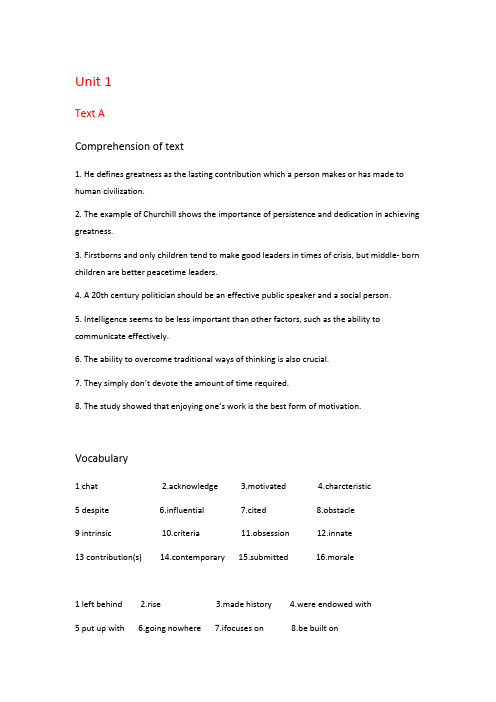
Unit 1Text AComprehension of text1. He defines greatness as the lasting contribution which a person makes or has made to human civilization.2. The example of Churchill shows the importance of persistence and dedication in achieving greatness.3. Firstborns and only children tend to make good leaders in times of crisis, but middle- born children are better peacetime leaders.4. A 20th century politician should be an effective public speaker and a social person.5. Intelligence seems to be less important than other factors, such as the ability to communicate effectively.6. The ability to overcome traditional ways of thinking is also crucial.7. They simply don’t devote the amount of time required.8. The study showed that enjoying one’s work is the best form of motivation.Vocabulary1 chat 2.acknowledge 3.motivated 4.charcteristic5 despite 6.influential 7.cited 8.obstacle9 intrinsic 10.criteria 11.obsession 12.innate13 contribution(s) 14.contemporary 15.submitted 16.morale1 left behind 2.rise 3.made history 4.were endowed with5 put up with 6.going nowhere 7.ifocuses on 8.be built on9 put in e up with 11.take charge 12.set...apartWord buildingefficiency emergency fluency frequencyproficiency tendency urgency sufficiency1 fluency 2.proficiency 3.emergency4.Efficiency 5 tendency 6.frequencyStructure1. For some students, it's not that they don't put in enough time —it's that they don’t have good study habits.2. Children perform differently at school. It's not that they have different IQs — it's that they are brought up in different environments.3. The company is not very productive. It's not that its staff aren't talented — it's that their energy hasn't been channeled effectively.4. I’m really sorry. It's not that I don't want to go to the cinema with you— it's that I have to finish my paper tonight.5. You have a stomachache. It's not that the food was bad — it's probably that you have too much stress from your work.1. President Wilson didn't try to bring the US back to economic and political isolation. Instead, he believed in international cooperation through an association of nations.puters don't teach students in groups. Instead, they can help them learn effectively according to their different needs.4. Some actors’ fame is built on their innate beauty, bu t despite his short stature, Dustin Hoffman rose above and it is his excellent acting that set him apart.5. After he took charge, we discovered that there were striking differences between him and his predecessor. He had the drive and passion, came up with many new ideas, and focused his work on how to raise our morale.6. Deng Xiaoping made history when he declared China's reform and opening-up policy. Despite tremendous obstacles, he made lasting contributions to our country's modernization with his unrelenting efforts.7. Why could someone with a genius IQ be left behind by a hardworking person with an average IQ? It has to be acknowledged that besides one's IQ, many other factors have much to do with one's achievements.8. This teacher is really remarkable in first motivating her students so she can really teach them something. It's not that she is talented, it's that she focuses completely or drawing their full attention in class.Text BGuessing meaning of the context1-5BADAC6-10ACCAB11-14DCABVocabulary exercises1 scandal 2.stirred 3.projected 4.attain 5.transformed6.faking7.conveyed8.eloquent 9 humiliate 10 coherent11 analysis 12 rally 13 determined 14 consoledError correction年出版的《伟大:谁创造了历史,原因何在》一书的作者。
- 1、下载文档前请自行甄别文档内容的完整性,平台不提供额外的编辑、内容补充、找答案等附加服务。
- 2、"仅部分预览"的文档,不可在线预览部分如存在完整性等问题,可反馈申请退款(可完整预览的文档不适用该条件!)。
- 3、如文档侵犯您的权益,请联系客服反馈,我们会尽快为您处理(人工客服工作时间:9:00-18:30)。
21世纪大学英语读写教程(第四册)课文译文1A谁是伟大的?迈克尔?赖恩阿尔伯特?爱因斯坦小时候在学校里的成绩很糟糕,老师们都认为他迟钝。
拿破仑?波拿巴年轻时只是法国陆军中几百名炮兵中尉中的一几乎没有受过正规教育的乔治?华盛顿,十几岁时不是受训当兵而是受训做土地测量员。
尽管他们的起步平淡无奇,但是每个人后来都为自己在历史上赢得了一席之地。
是什么使得他们变得伟大呢?是他们生来就具备一些特殊的东西?还是他们的伟大与时机掌握、献身精神和也许是一种坚定的个性更为有关?几十年来,科学家们一直在问这样的问题。
在过去几年里,他们已经发现了证据,这些证据有助于解释为什么有些人出类拔萃,而另外的人——也许同样很有才华——却被甩在了后面。
他们的发现可能对我们所有的人都有启示。
谁是伟大的?伟人的定义取决于如何衡量成功。
但标准还是有一些的。
‚对人类文明作出永久性贡献的人是伟大的,‛基思?西蒙顿院长说。
他是加州大学戴维斯分校的一名心理学教授,1994年出版的《伟大:谁创造历史,以及为什么》一书的作者。
但他又提醒说:‚有时侯伟人并没有被载入史册。
许多女性取得了巨大成就,或者颇具影响力,但却没有得到承认。
‛在这本书的写作中,西蒙顿把有关伟大人物的历史知识和遗传学、精神病学及社会科学领域的最新发现融合在了一起。
他所聚焦的伟人包括获得过诺贝尔奖、领导过伟大的国家或赢得过战争、谱写过流芳百世的交响乐或在科学、哲学、政治学或艺术上引起过革命性巨变的男性和女性。
虽然他没有一个公式来解释某些人怎样或为什么出类拔萃(其中涉及的因素太多了),但他却提出了一些共同的特点。
一种‚永不屈服‛的态度。
西蒙顿说,如果事业上取得巨大成就者具有什么共性的话,那就是一种持续不断地追求成功的动力。
‚人们往往认为他们天生具有一些超常非凡的东西,‛他解释道。
‚但研究结果表明,有的伟人并没有惊人的智力。
有的只是程度上的差异而已。
伟大是建立在大量的学习、实践和献身精神的基础之上的。
‛他举出二战时期的英国首相温斯顿?丘吉尔作为一个永不放弃的冒险者的典范。
丘吉尔在全国上下士气最为低落的时候被推上台,并出色地领导了英国人民。
在1940年盟军敦刻尔克大撤退之后的一次演讲中,他的话激励了全国人民,‚我们绝不会衰退、失败。
我们将坚持到底……我们永远不会屈服。
‛你可能生来就伟大吗?在研究丘吉尔的历史作用——以及其他政治领袖和军事领袖的作用时——西蒙顿发现了一个惊人的模式:‚头生者和独生者往往会成为危难时期的优秀领导者:他们习惯于承担责任。
但是在和平时期,中间出生者是更好的领袖:他们更善于倾听不同利益集团的呼声,作出必要的妥协。
独生子丘吉尔就很典型。
他在危机关头是伟大的,但是在和平时期他却并不称职——甚至于不得人心。
‛时机是又一个因素。
‚如果你把乔治?华盛顿放在20世纪,他作为一个政治家将一事无成,‛西蒙顿宣称。
‚他不善于在公众前演讲,他不喜欢同公众握手。
而从另一方面讲,我看富兰克林?罗斯福也很难在华盛顿的时代有所作为。
那时还没有他用来进行炉边谈话的收音机。
‛你可能太聪明吗?西蒙顿的一个出人意料的发现是,许多政治领袖和军事领袖虽然很聪明,但并非过于聪明。
他解释说,超过了某一程度,其他因素,如有效沟通的能力等,便变得比通过智商测试测得的先天智力更为重要了。
西蒙顿说,最具才智的美国总统——如托马斯?杰斐逊,伍德罗?威尔逊和约翰?F?肯尼迪——好不容易才当选,而其他智商更接近于平均水平的人(如沃沦?G?哈定)却大获全胜。
因为还涉及到政治和经济因素,所以具备天才般的智商并不是成为一名伟大领袖的必要条件。
在科学领域,西蒙顿补充说,那些具有‚天才级‛智商的人确实更有可能获得承认。
然而,证据也表明克服传统的思维方式也许同样重要。
他提到最近的一项研究:给了一些大学生一组数据,问他们能否找出一种数学关系。
几乎三分之一的人找了出来。
他们并不知道他们刚刚解出的是历史上最著名的科学等式之一:行星运动的第三定律,约翰尼斯?开普勒在1618年发现的一个等式。
西蒙顿说,开普勒的天才并不在于解决了一个数学难题,而在于用一种独特的方式思考数字——将其数学知识运用于对行星运动的观测之中。
正是他的胆识使他与众不同。
热爱你的工作。
童年时,爱因斯坦就迷上了磁铁同金属相吸的现象。
‚他忍不住要去想这件事,‛西蒙顿指出。
‚他16岁时就被物理学上的问题迷住了,并从未停止过对它们的研究。
所以他在26岁时就作出了巨大的贡献也就不足为奇了。
‛‚对我们大多数人来说,并不是我们没有能力,‛西蒙顿补充说,‚而是我们没有花费时间。
你必须投入精力,并忍受所有的挫折和障碍。
‛像其他有创造性的天才一样,爱因斯坦的动力并非对名誉的渴望,西蒙顿说。
相反,使他与众不同的是他对工作的痴迷。
这样的动力来自何处仍是一个谜。
但它几乎在所有有创造性的天才身上都能找到——无论他们的才华是否被同代人所承认。
‚艾米莉?迪金森的诗歌直到她去世后才得到承认,‛西蒙顿说。
‚但她并不是为了名而写。
詹姆斯?乔伊斯也是如此,他没有花很多时间去担心会有多少人会读《为芬尼根守灵》。
‛如今,研究者们有证据证明,对自己工作的一种内在的热情是出类拔萃的一个关键。
在由现哈佛大学工商管理教授特蕾莎?阿玛贝尔于1985年在布兰代斯大学主持的一项研究中,一批专业作家——没有一位是有名气的——被要求各写一首短诗。
当时每位作家被随机分到三个小组中:一个小组被要求记住是为金钱而写;另一个小组被要求想着只为消遣而写;第三组则没有得到任何指示。
然后这些诗歌匿名交给一个由专业作家组成的评判小组进行评审。
想着为金钱而写作的人所写的诗歌排名最低。
那些想着只为消遣而写作的人写得最好。
‚从对工作的热爱得到的动力起着重要的作用,‛阿玛贝尔说。
2A我们需要的感激A ?J ?克罗宁一个晴朗的下午,我在纽约上了一辆出租车。
从司机的表情和他猛拉排挡的样子中,我可以看出他很不高兴。
我问他是怎么回事。
‚我完全有理由生气,‛他怒气冲冲地说。
‚今天上午我的一个乘客把钱包忘在我车里了。
里面有近300块钱。
我花了一个多小时想方设法找那个家伙。
最后我在他的宾馆里找到了他。
他拿了钱包,一声不吭地瞪着眼看着我,好像我本来打算要偷他的钱包似的。
‛‚他没有给你酬金?‛我大声问。
‚一个子儿也没有。
但我要的不是钱……‛他咕哝着,然后突然大声说,‚只要那个家伙说句什么……‛因为他诚实的助人行为没有得到感激,那位出租车司机一整天都闷闷不乐,而且我知道以后他在做类似的好事之前会仔细考虑一下了。
这种对感激的需要是我们都能感受到的,而拒绝表示感谢则会大大扼杀善良与合作的精神。
第二次世界大战期间,辛辛那提的一位母亲收到他参军的儿子一封来信,信中提到诺曼底一个村庄中的一位妇女在他受伤饥饿时将他带到家中,帮他躲过了德国人的搜捕。
不幸的是,后来那男孩在阿登高地的进攻战中阵亡了。
然而,这位母亲却受到一种不可抗拒的愿望的驱使。
她积蓄了两年,穿过大西洋,找到了她儿子提到的那个村庄。
经过多次打听之后,她找到了那位曾经保护过她儿子的妇女——一位贫穷农夫的妻子——将一个包裹硬塞进她手里。
那是她儿子在毕业典礼上获得的一块金表,是那个男孩曾经拥有过的唯一真正有价值的东西。
这位母亲表示感激的举动深深触动了人们的心灵,在那个村庄内外成为传奇般的故事。
它比出色的演讲更能让人培养起对美国人的好感。
感激是对每一个无论大小的善行优雅地接受并表示欣赏的艺术。
我们大多数人受到款待,接受礼物和明显的好处时都不会忘记表示我们的愉悦之情,但即使在这种情况下我们也还能够完善我们表示感激的方式,让它尽可能的个人化和真诚。
最近,我和妻子在意大利南部旅游时,我给康涅狄格州的一位朋友寄去了几瓶令我们喜欢的当地佳酿。
那是件小小的礼物,然而令我们惊讶的是,我们收到的不是一封传统的感谢信而是一张电唱机唱片。
我们播放它时,听到了我们的朋友在饭后的一段话,描述他和他的客人们如何喜欢那酒,并感谢我们考虑得周到。
有这件不同寻常的东西来证明别人欣赏我们的礼物真令人愉快。
有时感激不仅仅是一件个人的事。
我在麦吉尔大学学医的儿子告诉我,有一位被送到蒙特利尔医院的病人经过输血而获救。
康复以后他问:‚我是否能找到那位献血者的名字,向他表示感谢?‛他被告知献血者的名字是从来不公开的。
出院几个星期后他回来献了一品脱血。
从那以后他一次又一次地为了同一目的回来。
当一名外科医生称赞这种不留姓名的高尚行为时,他只是回答说:‚有个我永远也不知道是谁的人为我这样做了。
我只是在说‘谢谢’。
‛感激不仅可以是一种转瞬即逝的情绪,在有些情况下还可以是一种能持续终生的更新,想到这一点真令人感到欣慰。
丈夫充满感激地回想起妻子慷慨无私的行为,妻子从不忘记丈夫送给她的礼物,这些都大大有助于使家庭生活保持和谐。
英国作家和博物学家W?H?赫德森曾经写道:‚一天晚上,我带一个朋友回家同我们一起吃了顿家常便饭。
后来他对我说:‘你真幸运,你的妻子虽然身体不好还要照顾孩子,但菜烧得那么好吃。
’那句赞美的话打开了我的眼睛,它教会我要感谢妻子日复一日的、而一直被我习以为常的英雄行为。
‛感激的礼仪首先应该在小事情上用得最多。
送报的男孩、送牛奶的人、邮递员、理发师、饭店里的女招待、开电梯的人——所有这些人都在以某种方式为我们服务。
通过表示感谢我们可以使日常平淡的关系具有人情味,使单调的任务变得令人愉快。
我的一位在伦敦当公共汽车售票员的病人有一次对我吐露说,‚有时我真厌倦了我的工作。
人们抱怨,麻烦你,说车钱找得不对。
但是有一位早晚乘我车的女士总是在我收她的车票时用一种特别友好的方式感谢我。
我真希望她是代表所有的乘客在说话。
这使我一直保持微笑。
‛阿诺德?本涅特的一个出版商夸奖自己的秘书效率特高。
一天,本涅特对她说:‚你的老板说你效率极高。
你的秘诀是什么?‛‚那不是我的秘诀,‛秘书回答。
‚那是他的。
‛每次她为他做一件事,无论多小的事,他从未忘记表示感谢。
因此,她工作一直非常努力。
有些人不愿表达感激之情,因为他们觉得这不会受欢迎。
我的一个病人在出院几个星期后回到医院来感谢他的护士。
‚我没有更早地回来,‛他解释说,‚是因为我猜想你们对于人们的感激一定厌烦得要命。
‛‚正好相反,‛她回答说,‚我很高兴你来。
很少有人意识到我们多么需要鼓励,我们从那些鼓励我们的人身上获得了多大的帮助。
‛我们所给予的感激永远不会过多。
因为我们身边的人在构筑他们的人生哲学时所依据的正是这些微笑、我们所表示的感谢和我们表示欣赏的各种小小的示意动作。
3A如何改变你的视角卡罗琳〃西博姆爱德华〃詹纳医生正忙于设法解决天花问题。
在研究了一个又一个病例之后,他仍然没有发现可能的治疗方法。
他的思维陷入了僵局。
这时,他改变了策略。
他不再把注意力集中在天花患者身上,而是把注意力转移到没有患天花的人身上。
